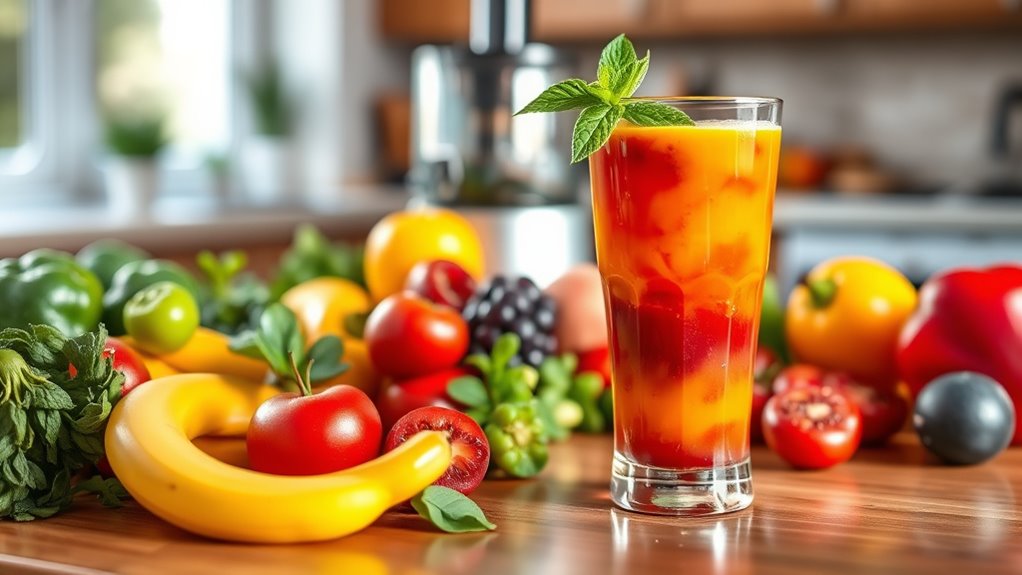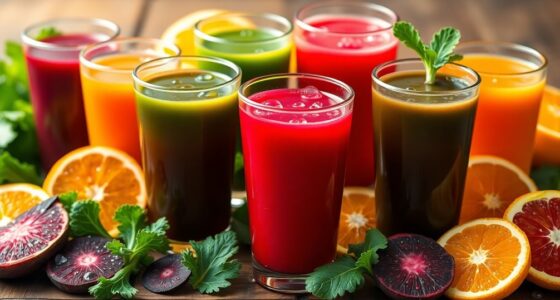Juicing’s packed with essential vitamins, antioxidants, and anti-inflammatory compounds that fight chronic diseases like heart disease and Type II diabetes. By boosting your intake of antioxidants and nutrients, you’re supporting your immune system and reducing inflammation. Juices also aid in detoxification and gut health while being low in calories, making them perfect for weight management. If you want to reveal the full potential of juicing and discover more benefits, there’s plenty more to explore!
Key Takeaways
- Juicing provides essential vitamins and antioxidants that help reduce the risk of chronic diseases, such as heart disease and Type II diabetes.
- Increased intake of raw fruits and vegetables through juicing enhances nutrient profiles, which helps combat oxidative stress and inflammation.
- Antioxidants in juices neutralize free radicals, thereby lowering inflammation levels and promoting long-term health benefits.
- Juicing supports liver detoxification and boosts nutrient absorption, contributing to effective weight management and reducing obesity-related health risks.
- A balanced diet combining juicing with whole foods ensures adequate fiber intake, essential for digestive health and overall wellness.
The Nutritional Power of Juicing

When you incorporate juicing into your diet, you tap into a concentrated source of essential vitamins, minerals, and antioxidants that can greatly boost your health.
Juicing allows you to easily consume a variety of fruits and vegetables, helping you meet dietary recommendations for nutrient absorption. This nutrient-dense profile is linked to lower risks of chronic diseases like heart disease and Type II diabetes.
The antioxidants in your juices combat oxidative stress, promoting cellular health and reducing inflammation. Plus, by enhancing your immune system with nutrients like vitamin C and zinc, juicing strengthens your body’s defenses against illness. Additionally, the health benefits of unique homemade fruit juice recipes can further enhance your overall well-being.
Antioxidants and Their Role in Disease Prevention
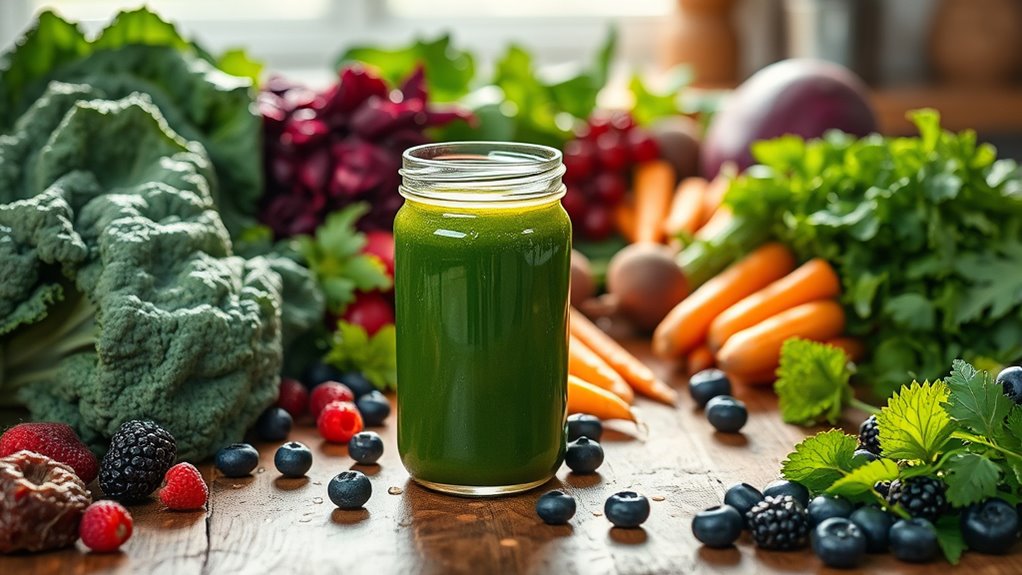
When you juice fruits and vegetables, you’re tapping into a powerhouse of antioxidants that can help reduce inflammation and promote long-term health. These nutrients play a vital role in combating oxidative stress, which is linked to chronic diseases. Additionally, the increased intake of raw fruits and vegetables can significantly enhance your overall nutrient profile and health outcomes.
Antioxidant Sources in Juicing
Juicing serves as a powerful way to boost your intake of antioxidants, which play an essential role in preventing chronic diseases.
By incorporating a variety of fruits and vegetables into your juices, you can enhance your health and combat oxidative stress.
Here are some top antioxidant sources in juicing:
- Blueberries: Packed with vitamin C and other antioxidants, they help reduce inflammation.
- Spinach: Rich in vitamin E, it supports immune function and fights oxidative damage.
- Carrots: High in beta carotene, they contribute to overall health and disease prevention.
- Kale: Loaded with antioxidants, it’s great for detoxification and maintaining energy.
Additionally, the tea industry is increasingly recognizing the health benefits of antioxidants found in various teas, which can complement your juicing regimen.
Impact on Inflammation Levels
Antioxidants greatly impact inflammation levels, helping to reduce chronic disease risk. When you incorporate juice from fruits and vegetables into your diet, you boost your intake of powerful antioxidants like vitamin C and flavonoids.
These nutrients neutralize free radicals, which contribute to chronic inflammation and diseases such as heart disease and cancer. The juicing process not only provides a concentrated source of these beneficial compounds but also encourages you to enjoy a wider variety of produce, enhancing your dietary quality.
Regularly consuming antioxidant-rich juices can support your immune function and promote recovery from inflammation-related damage. By prioritizing these nutrient-dense options, you can actively lower inflammation levels and safeguard your health against chronic diseases. Additionally, green juices are particularly beneficial due to their high levels of vitamins A, C, and K, which further enhance immune health.
Long-term Health Benefits
The promise of long-term health benefits lies in the power of antioxidants to protect your body from chronic diseases. By incorporating juicing into your diet, you can greatly enhance your overall health.
Here’s how antioxidants found in juices work:
- Combat oxidative stress linked to chronic diseases like heart disease and cancer.
- Improve cellular health and reduce inflammation, lowering your risk of illness.
- Bolster your immune system, promoting better bodily function.
- Support longevity by preventing age-related conditions such as Alzheimer’s.
Juicing provides concentrated sources of these powerful antioxidants, giving you an edge in fighting off free radicals. Additionally, ingredients like celery juice are rich in vitamins that may further support your health and wellness journey.
Embrace the benefits of juicing for a healthier future!
Enhancing Immune Function Through Juicing
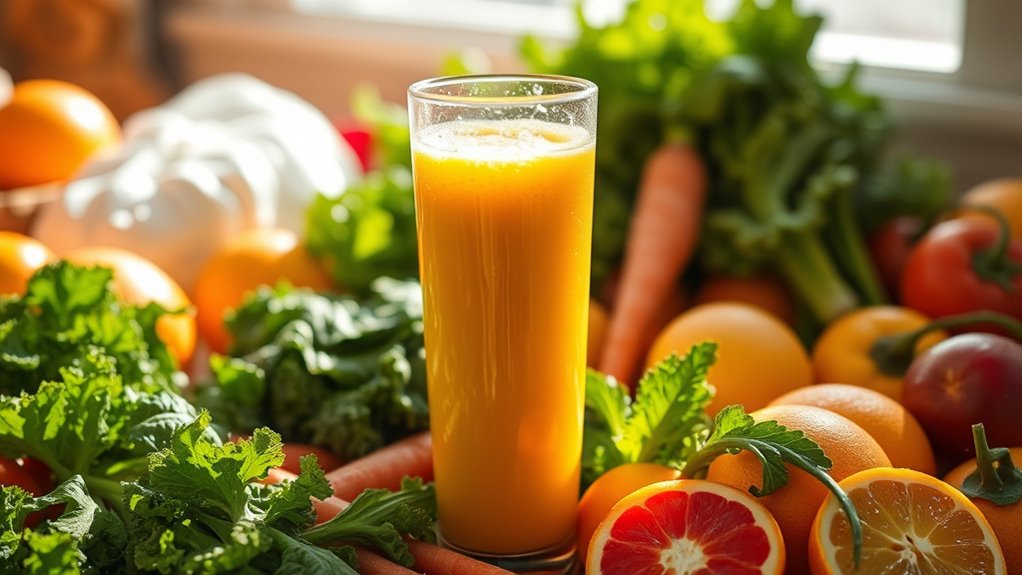
Juicing can be a powerful ally in boosting your immune function.
By packing in immune-boosting nutrients like vitamin C and zinc, you help your body fend off illnesses more effectively.
Plus, the antioxidant effects of these juices can reduce inflammation and support your health, especially during cold and flu seasons. Incorporating juice cleanses for weight loss can further enhance your overall wellness and immune response.
Immune-Boosting Nutrients
When you incorporate fresh juices into your diet, you tap into a powerhouse of immune-boosting nutrients essential for maintaining your health.
These nutrient-rich juices can help enhance your immune function and ward off infections, especially during seasonal changes.
Here are four key benefits of juicing:
- Vitamin C: Citrus juices provide more than your daily dose, vital for fighting infections.
- Zinc: This mineral supports immune efficiency and response.
- Anti-inflammatory properties: Ingredients like ginger and turmeric bolster overall health.
- Antioxidants: Juicing allows you to consume a variety of fruits and vegetables, maximizing your intake of immune-strengthening phytochemicals. Additionally, juices like beet juice support overall wellness by improving blood flow and lowering blood pressure.
Antioxidant Effects
Antioxidants play an essential role in enhancing your immune function, and incorporating juices into your diet is one of the best ways to boost your intake.
Juicing provides a concentrated source of antioxidants from fruits and vegetables, helping you combat oxidative stress and protect your cells from damage linked to chronic diseases like heart disease and cancer.
By regularly consuming antioxidant-rich juices, you can also reduce inflammation, a key factor in many chronic diseases.
Studies show that a diet high in antioxidants, often achieved through juicing, is associated with a lower risk of chronic diseases.
Plus, juicing increases your dietary quality and nutrient diversity, ensuring you reap the full health benefits necessary for peak immune function.
Seasonal Health Support
Here’s how juicing can boost your immune system:
- Vitamin C and Zinc: These essential nutrients are vital for your body’s defense mechanisms.
- Antioxidants: Fresh juice increases your antioxidant intake, combating oxidative stress and inflammation.
- Phytochemicals: Seasonal ingredients, like citrus and leafy greens, provide a variety of phytochemicals that support overall health.
- Digestive Health: Gut-friendly ingredients, such as ginger and turmeric, not only aid digestion but also enhance immune efficiency. Additionally, incorporating foods rich in antioxidants can further bolster your immune response.
Supporting Gut Health and Detoxification

Juicing can be a powerful ally in supporting gut health and detoxification, especially when you include gut-friendly ingredients like ginger and turmeric. These ingredients enhance digestion and promote a healthy gut microbiome.
By hydrating with fresh juices, you not only aid digestion but also support your liver’s detoxification processes, helping eliminate toxins effectively. Juicing boosts nutrient absorption, providing essential vitamins and minerals that contribute to overall gut health and strengthen your immune function.
Including a variety of fruits and vegetables increases your intake of antioxidants, which reduce inflammation in the gut and promote cellular health. Regular juicing supplies concentrated nutrients that support natural detox pathways, making it easier to maintain a healthy gut without restrictive diets. Moreover, incorporating meal replacement juices can help ensure you receive essential nutrients while managing calorie intake, further supporting your gut health journey.
Juicing for Weight Management
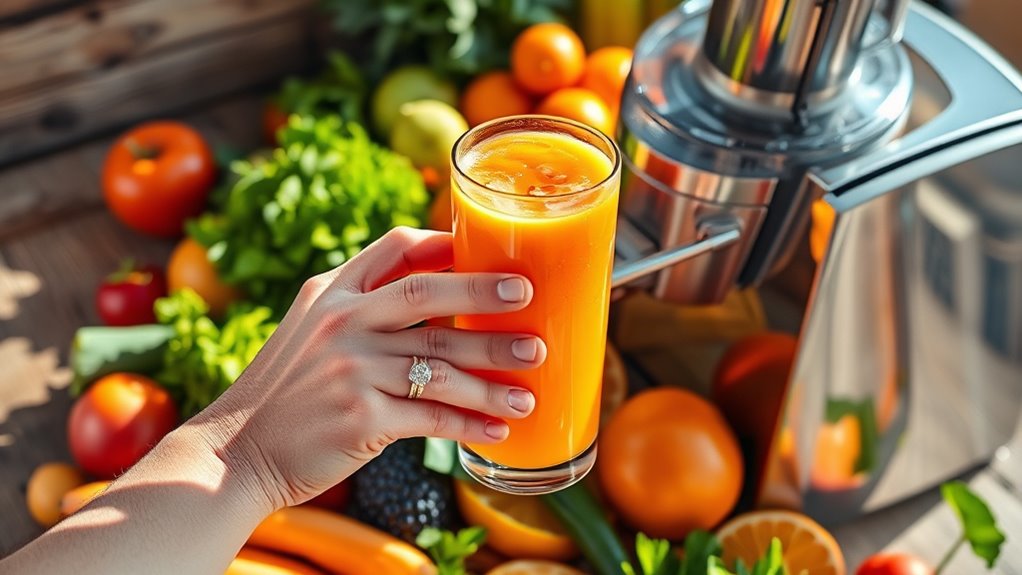
Maintaining a healthy gut can set the stage for effective weight management. Juicing offers a low-calorie, nutrient-dense way to help you reach your goals. Here’s how it can aid you:
- Promotes satiety: Juicing provides essential nutrients while keeping calories in check.
- Supports metabolism: Enhanced nutrient absorption can boost your metabolism and energy levels.
- Combats obesity: Vegetable juices can address issues like high blood pressure and insulin resistance.
- Encourages whole foods: Regular juicing helps reduce reliance on processed foods, leading to healthier weight loss.
Balancing Juicing With Whole Foods
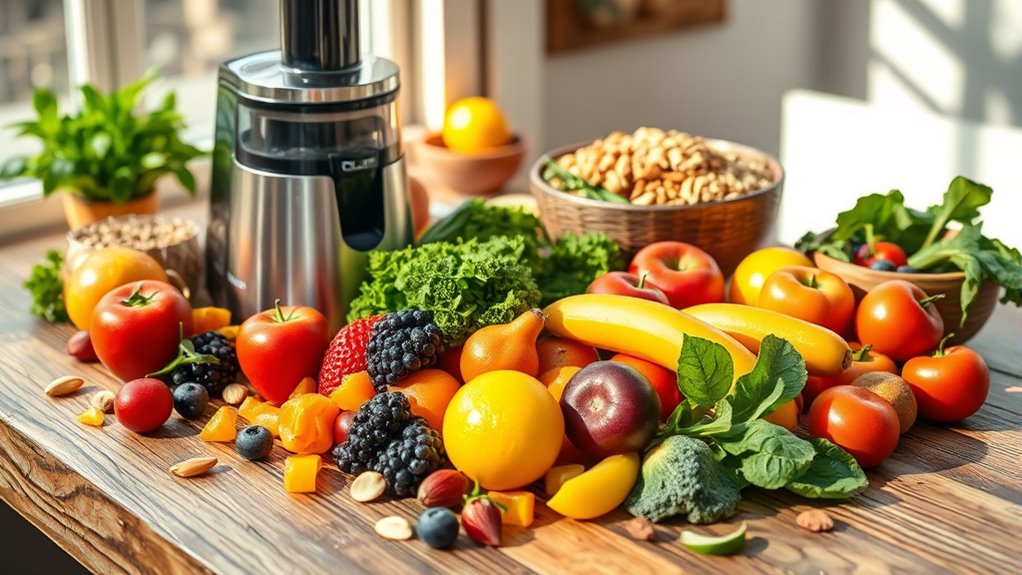
While juicing can be a great way to boost your nutrient intake, it’s essential to balance it with whole foods for a truly healthy diet. Whole fruits and vegetables provide dietary fiber, vital for digestive health and satiety.
A balanced diet should include the USDA’s recommended daily intake of 1 ½ to 2 cups of fruits and 2-3 cups of vegetables. Juicing can enhance nutrient absorption, but it shouldn’t replace whole foods. Incorporating chia seeds into your meals can further enhance nutritional value, providing essential omega-3 fatty acids.
Be mindful of high sugar content in fruit juices, as excessive consumption can lead to imbalances. Consult a healthcare professional to create a personalized plan that combines juicing with whole foods, ensuring you get the most benefits while maintaining overall health and wellness.
Frequently Asked Questions
Is There Scientific Evidence to Support Juicing for Health?
Yes, there’s scientific evidence supporting juicing for health.
Studies show that juicing can boost your nutrient intake, enhancing levels of vitamins like C and folate. These nutrients are linked to a lower risk of chronic diseases, including heart disease.
Juices packed with antioxidants can improve cardiovascular health and strengthen your immune function.
However, you should balance your juice consumption to avoid excess sugar, focusing more on vegetable juices than fruit juices.
What Is the 80/20 Rule for Juicing?
You might say the 80/20 rule for juicing is a game changer. Fundamentally, 80% of your juice should come from veggies, while 20% can be fruits.
This balance maximizes nutrients and keeps sugar in check. By prioritizing leafy greens and cruciferous veggies, you’ll enhance your vitamin and mineral intake without overloading on fructose.
Sticking to this guideline helps you create a sustainable juicing habit that supports overall health and well-being.
What Do Doctors Say About Juicing?
Doctors often highlight the benefits of juicing as a way to boost your nutrient intake. They say it can provide essential vitamins that support your immune system and may lower your risk of chronic diseases.
However, they caution that juicing shouldn’t replace whole foods, as you miss out on important dietary fiber.
What Happens to Your Body After 3 Days of Juicing?
Juicing for three days is like giving your body a revitalizing rain shower after a long drought.
You’ll likely feel a surge in energy as vitamins and antioxidants flood your system, boosting your mood. Your digestion might improve, but you could also face some bloating from the lack of fiber.
While you may lose weight initially, remember it’s often not sustainable. Your body might also enjoy a temporary detox and better nutrient absorption.
Conclusion
Incorporating juicing into your diet can be a game-changer for your health. Did you know that the average person consumes only about 1.5 servings of fruits and vegetables daily, while experts recommend at least five? By juicing, you can easily boost your intake of essential nutrients and antioxidants that help fight chronic diseases. Remember, juicing is a powerful ally, but it works best when balanced with whole foods. So, grab your juicer and start reaping the benefits today!
Cindy thoroughly researches juicing trends, techniques, and recipes to provide readers with practical advice and inspiration. Her writing style is accessible, engaging, and designed to make complex concepts easy to understand. Cindy’s dedication to promoting the advantages of juicing shines through her work, empowering readers to make positive changes in their lives through the simple act of juicing.

